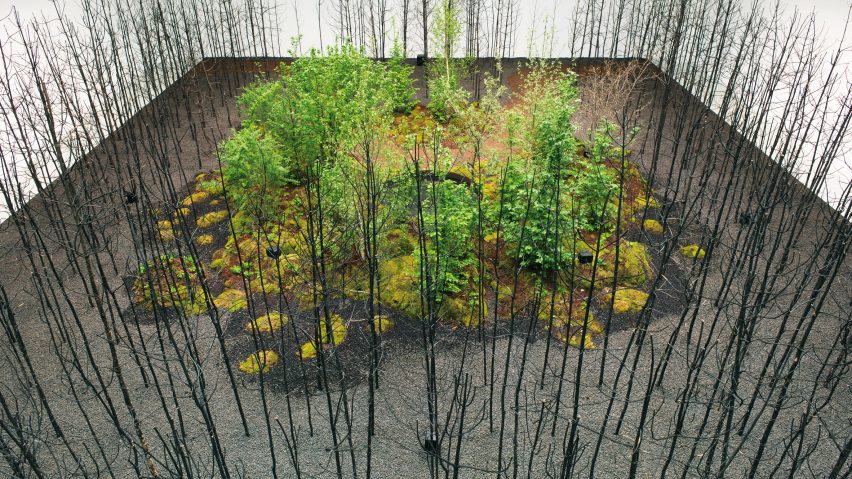Design studio Superflux has set up hundreds of trees damaged by forest fires around an oasis of living plants for an installation called Invocation for Hope at the Museum of Applied Arts in Vienna.
The exhibition is on display as part of the Vienna Biennale for Change 2021, which has the theme Planet Love: Climate Care in the Digital Age.
Superflux transported 415 dead black pine trees from Austria's Neunkirchen region to the capital. The Anglo-Indian studio collaborated with the local forestry and fire departments to salvage the trees.
They used horses to drag the dead pines, which had been burned in wildfires and had to be specially treated for display, to shipping containers to transport them to the museum.
The exhibition also features 27 living trees, shrubs, mosses, grass and lichen that have been planted in the centre of the installation around a circular reflective pool.
These plants will continue to grow throughout the exhibition, thanks to a combination of regular watering and light from grow lamps and a skylight overhead.
A two-way mirror sits at the bottom of the pool in front of a screen onto which video is projected.
When visitors to the MAK look into the pool they will see footage captured by underwater cameras placed in the water troughs of animals such as lynx and bison at the Alpenzoo Innsbruck, an Austrian zoo.
A soundscape by the musician Cosmo Sheldrake plays over the exhibition.
Superflux said Invocation for Hope is an imagined vision of a post-Anthropocene landscape where humans learn to live in harmony with nature.
"Climate change is not a problem we can 'solve' but rather a predicament we must navigate with responsibility and urgency," said Superflux co-founder Jon Ardern.
The fire-ravaged trees represent the impact of humans on nature, as wildfires proliferate where trees are planted by humans as a monoculture. The living oasis is a symbol of hope to encourage people to think about new ways to live with the natural world after climate change.
"Our proposal for a way out of this dilemma is to completely change the way we view ourselves and our relationship with nature," said Superflux co-founder Anab Jain.
"Instead of seeing humans as separate from nature, we need to understand that we are a part of it," she added.
"By radically changing our attitude toward natural systems and the ecology of our planet, we have the best chance to reverse the damage we've done. How might we – humans and non-humans – truly engage in collaborative living?”
Superflux said it has designed every element of Invocation for Hope to live on after the event, in order to offset the carbon emissions created in making it.
The living trees will be donated to schools and the burnt ones will be turned into compost and spread over a garden in the city.
“A more-than-human perspective allows us to see how we are ecologically, economically and emotionally entangled with all species on the planet," said Jain.
"We want to foreground how we're a part of a larger ecology rather than the masters of nature."
Superflux has also created a climate change-themed installation at this year's Venice Architecture Biennale. Called Refuge for Resurgence, it imagines different species coming together for a shared banquet in a post-Anthropocene future.
More tree installations include Maya Lin's Ghost Forest in New York City and Es Devlin's Forest For Change at the London Design Biennale.
Invocation for Hope is on at the MAK in Vienna from 28 May to 3 October 2021. See Dezeen Events Guide for an up-to-date list of architecture and design events taking place around the world.

